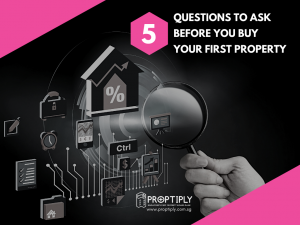
Buying an investment property is a major financial decision. There are always risks and rewards to every investment decision, so you need to be strategic and rational to determine whether an investment is right for you.
Here are five key questions you will need to ask before you purchase your first investment property:
1. What is a suitable entry price?
When you invest in a property, one of your objectives may be to make a capital gain in the future. As the real estate market is known to be cyclical, you need to do your homework in order to time your entry into the market at a price that’s right for you. Compare the recently transacted prices, highest or lowest transacted prices, and asking prices to make an informed decision. To limit your risk, you should also consider purchasing below-market-value properties, which are at an asking price that is below their valuation.
2. What will my financial obligations be and what expenses do I have to pay to be landlord?
There are various costs and expenses that are involved in being a landlord. The biggest financial obligation will be the mortgage for your loan and the initial down payment. Aside from this, you will also need to set aside money for expenses such as: property tax, income tax, repairs and maintenance, utilities and wifi, fire insurance, management fees, costs of securing a tenant such as agent and lawyer fees, marketing and advertising, furnishings and stamp duty. It is essential to evaluate all the costs involved so that you can find a property that can suit your budget.
3. What kind of rental yield can I get and is it enough to cover my expenses?
A key motivation for investing in property is that it entitles you to receive rental income every month. Ideally, that regular cheque payment should be enough to cover your loan payments and also offset your expenses. And it is best if you can generate positive cash flow you’re your property i.e. the amount of money flowing in exceeds the amount of money you have to pay each month. This leftover residual income is your positive cash flow and provides you with a source of passive income. Therefore, narrow down properties which can give you an attractive rental yield and which can also help you to generate positive cash flow. You will need to compare the rental transactions of properties in similar areas you are eyeing to assess the type of rental yield you are able to get.
4. Am I eligible for a mortgage, should I apply for a mortgage and how much should I mortgage?
Even if you have enough cash to pay an investment property in cash, it might make more sense to get a mortgage especially if you inten on investing in several properties and if your rental income can cover your mortgage payments plus interest, with some leftover sum. This will mean that your cash is not all tied up in a single place and you can build your assets at a quicker place – provided you manage your risks properly. Whether you are eligible for a mortgage would depend on your financial strength. Banks will usually have a list of requirements which you have to meet before they are willing to finance your property. You will need to assess the level of risk you are willing to take and whether you have sufficient cash to act as a buffer during times of economic uncertainty. If you are purchasing an industrial property, you may even need to prepare adequate documentation to demonstrate that your property is able to generate a stable income stream to cover your mortgage.
5. What type of property should I invest in?
Each property type – whether it’s residential, commercial or industrial – has its own features, advantages and disadvantages. A major advantage that commercial or industrial property has over residential property is that there is no additional buyer’s stamp duty (ABSD) involved. Rental yields also tend to be higher for industrial or commercial property. However, CPF cannot be used to pay for commercial or industrial property. The location of the property is a very important consideration. Connectivity and transportation will make your property easier to rent out. A unit that is near the MRT station and also close to amenities such as the food court, banks and shops are plus points.